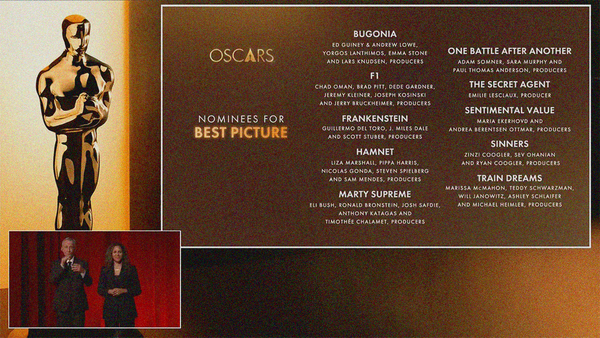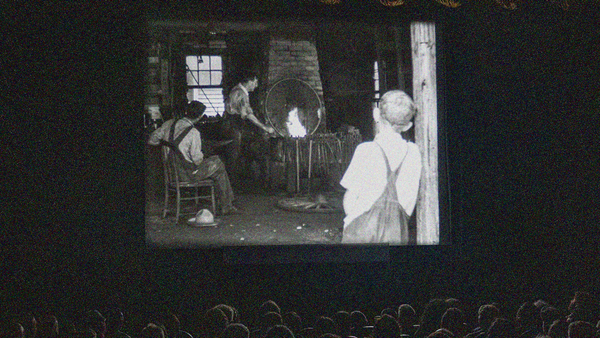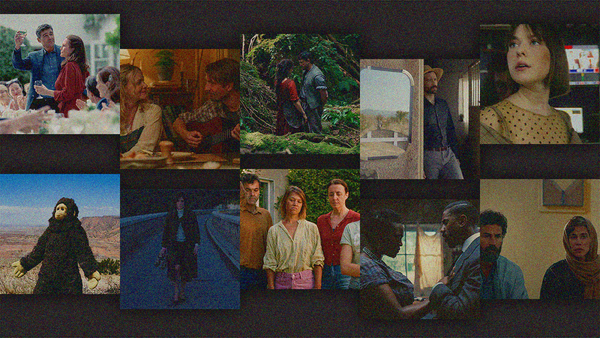Week Ending 10/17/25
Free films at Shea's

This season of Shea's programming marks the theater's 100th anniversary. While mostly known for their theatrical stage shows, a free film series of family fare has also been an annual staple. This year's slate has just been announced:
• Hocus Pocus - 7:00pm on Thursday, October 30, 2025
• Elf - 7:00pm on Friday, December 12, 2025
• The Parent Trap [1998] - 11:00am on Sunday, January 18, 2026
• The Goonies - 4:00pm on Sunday, January 18, 2026
• The Incredibles - 11:00am on Sunday, February 22, 2026
• Guardians of the Galaxy - 4:00pm on Sunday, February 22, 2026
• Jurassic World Rebirth - 1:00pm on Sunday, March 8, 2026
• A Minecraft Movie - 1:00pm on Sunday, May 17, 2026
All screenings will take place at Shea's Buffalo Theatre—a name that I will admit threw me for a bit of a loop. I guess I missed the rebranding of Shea's Performing Arts Center as a catch-all "campus" moniker. So, that old name of its flagship address at 646 Main Street is now the umbrella term with that address going by Shea's Buffalo. Shea's Smith (at 658 Main Street) and Shea's 710 (the old Studio Arena at 710 Main Street) remain the same.
Tickets for the free films will go "on-sale" approximately three weeks before each date. Reserve yours for Hocus Pocus now.

The Mastermind

It's a case of opportunity. If the Framingham Museum of Art's lone guard on the second floor is always sleeping, why not see what you can get away with? JB Mooney (Josh O'Connor) has a lot of time on his hands since carpentry work in his Massachusetts town has dried up and he has no ambition to become a foreman. That coupled with his well-to-do parents' (Hope Davis' Sarah and Bill Camp's Judge Bill) membership means he can case the space daily, enlist his sons to cause a commotion and test the guard's slumber, and even steal a figurine.
Writer/director Kelly Reichardt ensures we know such an operation is just a game at the start of The Mastermind. We see it through JB's surprise that he actually got away with taking the miniature and his father overtly calling him out for not applying himself to a career. We're therefore dealing with an amateur. A former art student of privilege who recognizes a couple paintings in the museum from his studies and has an epiphany to flip them for a substantial pile of cash against the backdrop of 1970s Vietnam-era America. His eyes are way too big.
Imagining the perfect heist is different than completing it. You must be able to trust your accomplices (which he surely cannot), understand your exit strategy (and hope it's better than the one Gaby Hoffmann's Maude guesses), and be able to read a calendar. Because things can only go downhill after discovering he didn't know his kids had off from school the day of the crime. That's a simple problem to be fixed by a sitter or couple bucks at the bowling alley. Losing your driver and allowing a gun to enter the equation are much more complicated.
As such, Reichardt writes the theft as a humorous series of missteps and inconveniences. O'Connor nails the hangdog expression of finding himself thrust into taking a hands-on approach to what he believed would be very hands-off. Each new wrinkle sends him into an exasperated spiral that should make him walk away to live and fight another day. His JB is so laser-focused and determined not to squander his not-so-foolproof-plan, that he leans in further instead. And he assumes paying everyone a few bucks will mitigate future risk.
Well, since the post-heist events are even more absurd, JB learns quickly that it wasn't a solid bet to take. Because each slip not only puts the police on his tail, but also other criminals who recognize this easy mark that's way out of his depth by reading the papers. I was having so much fun that I couldn't wait for what came next to ruin his life more ... until I realized nothing else might be coming after all. The third act is where Reichardt's trademarked pacing enters the fray to replace entertainment with inevitability.
The Mastermind doesn't fall apart, though. Watching JB traverse his impossible situation by hitting up friends for help (the aforementioned Maude and her husband Fred, played by John Magaro), leaving his wife (Alana Haim's Terri) behind, and turning to petty thievery in hopes of outrunning his felony charge is still a worthwhile endeavor. It just loses the electricity of those first two-thirds that chugged along to Rob Mazurek's score. It's so night and day that I don't recall there being any music at all once JB becomes a fugitive.
Thankfully, Reichardt still delivers a fantastic parting shot once karma closes the gap on her antihero protagonist. It's a perfectly orchestrate final sequence that plays similarly to the two heists from the beginning—checkpoint to checkpoint with a couple surprises to flip expectations on their head. So, despite the lull, I did ultimately leave with as big a smile as the one I had at the start due to this reprise. It helps that O'Connor never forgets to play JB as an everyman punching above his weight class too. He can't know what he doesn't know.
The whole cast is great from Camp's entitlement to Davis' charity or Hoffman's pragmatism to Magaro's idealism or Eli Gelb's paranoia to Javion Allen's recklessness. JB is the calm straight man in a world of colorful characters who inevitably tries to be what he isn't. There's no better example of this fact than to see O'Connor's silent surrender while Matthew Maher laughs in his face for having screwed it all up. It just goes to show that nepotistic comfort can cause the most boring and directionless amongst to fall victim to hubris.
7/10
One Battle After Another

Paul Thomas Anderson says he had three ideas bouncing around his head before finally putting them together for One Battle After Another. One was an action car-chase. Another was an adaptation of Thomas Pynchon's Vineland (the author of the director's earlier film Inherent Vice). And the third was something that incorporated a woman revolutionary. To know this before sitting down to watch the result is to know exactly which parts are which.
Act One: Perfidia Beverly Hills (Teyana Taylor). A badass rebel ready to take down the fascistic military machine one hot button issue at a time (immigration, abortion, etc.). Act Two: Bob Ferguson (Leonardo DiCaprio). A kindred spirit to Joaquin Phoenix's "Doc" Sportello considering sixteen years spent frying his brain with drugs and alcohol has him wondering if the notion that the government might still be hunting him is real or paranoia. Act Three: Willa Ferguson (Chase Infiniti). Their imperiled daughter on the road.
The man connecting them is Col. Steven J. Lockjaw (Sean Penn)—a key military figure in the war for white purity who transforms from Perfidia's victim into Bob and Willa's pursuer. Countering his power trip are two indispensable allies to the cause via Regina Hall's Deandra (the pragmatic realist of Perfidia's "French 75") and Benicio Del Toro's Sensei Sergio St. Carlos (a new wave Harriet Tubman whose zen disposition allows him to be the perfect foil to Bob's lunacy).
While one would assume from the marketing push and buzzy chatter (on both sides of the aisle) that they're woven into a plot about rebellion, that isn't the case. No, One Battle After Another may exist in a world similar to the white supremacist, Christo-fascist ethnostate the MAGA movement is swiftly constructing today, but its story is conversely about parenthood amidst revolution. Do you choose the mission (and by extension your own ego) like Perfidia and Lockjaw? Or do you choose the next generation (by way of your children) like Bob?
That's the central question everything else orbits. And it's answered pretty early considering Bob is the de facto protagonist willing to do whatever it takes to save his daughter while the new rebellious regime (led in part, for reductive purposes, by Sensei) does whatever it takes to help him as an OG legend. Is putting Perfidia and Lockjaw into the same bucket by way of their selfish desire for glory a relevant choice to make? Sure. Should Anderson have taken more care to give its complexity justice? Definitely.
Because despite both characters ultimately turning on their own blood, the context behind that choice is vastly different. You're talking about a revolutionary and a Nazi. And since Nazis call themselves revolutionaries while labeling the Perfidias of the world animals, the nuance of their identities demands attention. By simply glossing over this fact to lean into the fun of a burnout swearing over the phone at the "French 75" because he can't remember their passcode, you kind of give the false equivalency credence.
It therefore takes some mental gymnastics to blindly disregard the flippant way in which the film's politics are exploited/satirized. A lot of people are apparently okay with that considering the raves have One Battle After Another as the odds-on favorite to win Oscar, but I'd implore you to pump the breaks. Let it be your problematic fave (much like Licorice Pizza considering its own controversial choices in the name of comedy), but don't pretend it's some irreproachable masterpiece. Flaws should be discussed, not erased.
That being said, I enjoyed the ride too. Anderson knows how to make a three-hour runtime entertaining and every second DiCaprio and Del Toro are on-screen together is a gift from God. No one was more surprised than me that their Inherent Vice-portion of the film is my favorite considering I believe that's the filmmaker's weakest title, but the juxtaposition of two dudes with good vibes thwarting a domestic military invasion is just what we need today. They're the inflatable frogs pissing off ICE by simply dancing in the streets.
It's just a shame, though, that their shenanigans overshadow the bigger message. Because the Perfidia part captivates thanks to another great Taylor performance before evaporating so Lockjaw and Bob can unknowingly partake in a sperm count competition. And the car chase is super riveting despite also being rushed by its need to introduce new and forgettable players for its violent panache. So, I guess what I'm saying is that this is one very good film that might have been three great ones. Less isn't always more.
8/10
The Man Who Saves the World?

There was a time in Hollywood where question marks were verboten in titles due to a superstition that the use of one would cause the project to bomb at the box office. I learned this fact a long time ago because it always seemed strange that Who Framed Roger Rabbit omitted the punctuation. The more you look, however, the more you realize there are a ton of films that do use it—enough to wonder if that superstition is apocryphal. Because some films, like Gabe Polsky's The Man Who Saves the World?, don't work without one.
Remove the question mark and the title becomes a statement: Patrick McCollum is the man who saves the world. That isn't the filmmaker's intent, though. It isn't even what the filmmaker believes (at least not initially). No, Polsky comes at his topic from a place of pure skepticism because you cannot feasibly listen to McCollum's story without assuming he's a certified crackpot. It's only when the details of that story start spiraling that you wonder if he might be telling the truth. Hence the punctuation. Could Patrick truly be our savior?
Polsky attempts to find the answer by following this bona fide renaissance man for over two years as he works to fulfill his part of an ancient indigenous prophecy wherein a solitary figure is foretold to unite the world's native people so they can heal Mother Nature and therefore preserve mankind in the process. McCollum explains that four South American elders told him he was that figure and, through what could be construed as coincidental happenstance, he allows himself to believe it too. Not to become a prophet, but to facilitate a spark.
The film only works if it consciously understands its own subject's absurdity. So, Polsky lets McCollum tell his uncensored story, hires a private investigator to do the necessary research confirming it, and experiences his genuine connection to the indigenous world with his own eyes. Because it's one thing to delude yourself into becoming a white savior, but it's another if the native people you're trying to save bestow that title upon you unprovoked. Is Patrick McCollum probably a bit of both? Sure. But the work is getting done.
And that's the real draw. Not that he's the linchpin to some crazy idea of saving the Amazon (I do like that Polsky never conflates "saving nature to save humanity" with "saving humanity" since everything McCollum says being true doesn't prevent mankind from destroying itself anyway), but that the actions born from that idea might do so regardless of veracity. It's a chicken and egg conundrum wherein cause and effect can be found in hindsight. By giving McCollum importance, he unwittingly does important things.
So, while you must commend Polsky for never wavering in his desire for concrete answers to corroborate McCollum's stories (or mocking him), you can't argue with the latter's declaration that being at the place of unification because of his part in putting its many sides together is evidence enough. That's the beauty and frustration of faith: that which negates bias for one person is exactly what creates it for another. Add vast language and cultural barriers to the equation and it could be that McCollum and the tribes accidentally duped each other.
Does it matter? Not if it proves a success. Because nobody is being harmed—at least not as presented. If McCollum wants to spend his time and money pursuing this cause, why stop him? If the weird yet charismatic white guy who keeps popping up at their religious and indigenous gatherings serves as a crucial networking arm bridging divides and forming coalitions, why stop inviting him? In a perfect world these are all just human beings with a common goal. Race and prejudice are constructs projected upon them.
Will anything come of it? Who knows? As I said, saving the rainforest is a moot point if we keep killing each other anyway. But it is a piece to the puzzle—or "tapestry" as the late Jane Goodall (a McCollum friend and fan) describes it. It's one domino that must fall so others may too. Whether it be based on delusions of grandeur or a leap of faith is inconsequential as long as the players involved see it as a path forward for their mission. Let the guy play his homemade violin (No one mentions the swastika on that first photo?) while acting as a matchmaker.
Because his near-death experience, insane resume, and half-built mansion by his own two hands aren't even the strangest part of the whole. No, that's multi-millionaire real estate mogul Joey Nittolo giving away his fortune to follow his third eye's visions—one of which led him to McCollum and thus reinforced his role in the prophecy. Kudos to Polsky for somehow wading through it all with a straight face and open mind because it means we can too. Something we forget in today's world of celebrity "geniuses" is that actions always trump image.
7/10
River of Grass

I never got to visit the Florida Everglades as my family left Sunrise to return to Buffalo two years before the fourth grade trip my sister had just taken. It always seemed like a cool excursion, though. I was too young to remember details, but that area remained front of mind just by proximity. No one talks about the region here in New York because our schools customize their curriculum to the place in which its taught. So, it was nice to watch Sasha Wortzel's River of Grass and think that I might have learned a thing or two more had I stayed.
This is as much a love letter to her Everglades home as it is an education on its history and importance to both the planet's survival and our own as a species. When Wortzel is relaying her own thoughts, the words are heard above nature scenes and archival footage. When she's reading from Marjory Stoneman Douglas' book, the same occurs with the addition of the text superimposed above the imagery. And when she turns things over to her subjects, they are given our full attention to explain their respective missions.
Betty Osceola leads prayer walks to better inform the general populace about the water and the land being held as ancestors to the indigenous Miccosukee. Two-Spirit poet/activist Reverend Houston R. Cypress leads tours through the area while telling stories of the tree islands and spreading the same reverie they were taught by Osceola. Kina Phillips describes the toxic air pollution she's inhaled for four decades living along the path of Big Sugar's seasonal burning. And Donna Kalil takes us on a python hunt to save the region's remaining natural wildlife.
These figures come and go to provide contemporary context to the impact mankind has had via climate change, commercialization, and technological advancements that unfortunately also lead to destruction miles away. We learn about alligators being a keystone species, the man-made levies around Lake Okeechobee, and the fight to stop a Nixon-era Miami airport expansion. And woven throughout is an eighty-year-old Douglas orating her own twenty-year fight to protect the Everglades as a National Park.
The latter leads to some captivating moments as Wortzel utilizes a lot of old outtake footage with off-camera voices directing Douglas in the frame. There's also b-roll of nature shots with the cameraman berating animals to flap wings or move just right as other people use long poles to poke and prod them into doing the same. It's an effective aesthetic choice insofar as showing just how much of what we see and experience is in fact manipulated by unseen forces. So much of what we know is actually what we've been told.
It's not therefore lost on us to comprehend that what we see of the Everglades now isn't what it was decades ago. It's not even the place my sister visited in 1989 anymore either. Our country displaced indigenous populations to turn the swamp into farmland. They sacrificed freshwater reserves and blocked other sources from flowing back in. They've spent so much money and effort to drain the area that the loss of animal life and increased heat index risks putting it all back underwater as it was millennia ago.
That's why centering voices like Osceola is important. Building around Douglas is a nice way into the subject (and Osceola admits the author was a friend of the native community despite unwittingly "stealing" the title of her book from them), but she was still a transplant. Osceola and Phillips have deep Florida roots. Their families have been there for generations and know the tenuous balance between man and nature. They understand the land and water are heading for a reset and hope we join in and help earn our place upon them in the aftermath.
7/10

This week saw Blind Date (1987), Hiding Out (1987), Life Without Dick (2002), Power Rangers (2017), and What's Cooking? (2000) added to the archive (cinematicfbombs.com).
Bruce Willis dropping an f-bomb in Blind Date.

Opening Buffalo-area theaters 10/17/25 -
• After the Hunt at Dipson Amherst; Regal Galleria, Quaker
• Bison at Regal Elmwood
• Black Phone 2 at Dipson Flix, Capitol; AMC Maple Ridge, Market Arcade; Regal Elmwood, Transit, Galleria, Quaker
• Dude at Regal Elmwood
• Good Fortune at Dipson Flix, Capitol; AMC Maple Ridge, Market Arcade; Regal Elmwood, Transit, Galleria, Quaker
"It’s a well-made directorial debut that shows a love for cinematic history and a unique sensibility to build upon it rather than simply homage. Communal entertainment with lighthearted surrealist fantasy and relatable everyman problems." – Full thoughts at The Film Stage.
• Halloween 4K (1978) at North Park Theatre (select times)
"Recognizing a work's cultural significance and craft doesn't automatically make it a masterpiece if it cannot also impact you emotionally. I personally have never quite gotten there with this title no matter how hard I try." – Full thoughts from 2021 at jaredmobarak.com.
• K-Ramp at Regal Elmwood
• Mithra Mandali at Regal Elmwood
• Pets on A Train at Dipson Flix, Capitol; Regal Elmwood, Transit, Quaker
• A Savage Art: The Life & Cartoons of Pat Oliphant at North Park Theatre (select times)
• Telusu Kada at Regal Elmwood
• Truth & Treason at Dipson Capitol; AMC Maple Ridge; Regal Elmwood, Transit, Galleria, Quaker
• Urchin at Regal Elmwood, Quaker
"[Dillane] lends the role enough charm and humor to make friends quickly while also imbuing the desperation necessary to turn on a dime and exploit that camaraderie for selfish gain." – Full thoughts at HHYS.
• Waltzing with Brando at North Park Theatre (select times)
Streaming from 10/17/25 -
• 27 Nights (Netflix) - 10/17
• 40 Acres (Hulu) - 10/17
• Good News (Netflix) - 10/17
• Other (Shudder) - 10/17
• The Perfect Neighbor (Netflix) - 10/17
• R.L. Stine's Pumpkinhead (Tubi) - 10/17
• She Walks in Darkness (Netflix) - 10/17
• Turn of the Tide: The Surreal Story of Rabo de Peixe (Netflix) - 10/17
• The Twits (Netflix) - 10/17
• Armed Only With A Camera: The Life and Death of Brent Renaud (HBO Max) - 10/21
• Who Killed the Montreal Expos? (Netflix) - 10/21
• The Hand That Rocks the Cradle (Hulu) - 10/22
• Host (Prime) - 10/23
• The Elixir (Netflix) - 10/23
Now on VOD/Digital HD -
• A Big Bold Beautiful Journey (10/14)
• Gabby's Dollhouse: The Movie (10/14)
• The Glassworker (10/14)
"Whatever might happen to them in the end doesn't erase what they made. The art itself is released into the world to heal old wounds and inspire new genius. Art is immortal." – Full thoughts at HHYS.
• Guns & Moses (10/14)
• Kerouac's Road: The Beat of a Nation (10/14)
• The Mannequin (10/14)
• ReEntry (10/14)
• The Senior (10/14)
• The Strangers: Chapter 2 (10/14)
• Down to the Felt (10/17)
• Everything to Me (10/17)
• The Jester 2 (10/17)

Pieces from the Jason Goes to Hell: The Final Friday (1993) press kit.






